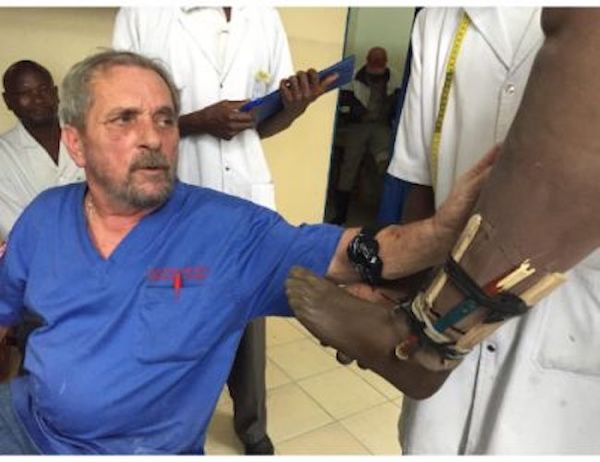Film Review: “The Wake Up Call” — A New and Important Feature Documentary
By Gerald Peary
Eric Neudel and Alison Gilkey found a tremendous subject for a documentary, and have told his tale with urgency and compassion.

A scene from The Wake Up Call.
Credit Eric Neudel with one of the most potent, mesmerizing Boston documentaries of all time, Steps (1980), in which a young woman, who became paralyzed after an auto accident, retraces moment by moment her fateful night. I programmed that film in 1980 when I was the co-director of the 2nd Boston Film Festival at the Coolidge Corner. Then, though we both live locally, I lost contact with Neudel for more than forty years. I have learned on IMDB that he directed several more documentaries but has been employed steadily at WGBH as a producer-editor. His most high profile work was directing Lives Worth Living about disability rights, which played in 2011 on PBS’s Independent Lens. The associate producer of that film was Alison Gilkey, She is co-director with Neudel of a new and vital feature documentary, The Wake Up Call, which can be seen April 17 at 3 pm at the Boston International Film Festival.
Once again, Neudel’s non-fiction protagonist is a disabled person. But unlike the wheelchair-bound heroine of Steps, Dave Evans has managed to rise up triumphantly from his debilitating, almost fatal injuries suffered in Vietnam. Willful and stubborn, he can dance about on his prosthetic legs with a boombox on his shoulder; and he can traverse the third world as a self-trained medical aid helping others who have suffered similar injuries, who are missing arms and legs as victims of war. In an extended section of The Wake Up Call, the filmmakers fly to Jordan and photograph the impolitic Evans ordering doctors and nurses about who are charged daily with crippled Syrian civilians caught between Bashar al-Assad’s oppressive government, Al Qaeda, and American drones.
For its first act, The Wake Up Call takes viewers back to a place, frankly, where few wish to be, a reliving of the horrors and stupidities of the Vietnam War. It’s been a long time since we have been faced in cinema with these once-ubiquitous stories of how the American military on the ground were lied to and duped, persuaded that it was a noble thing to ship out to Southeast Asia and fight Communism. We hear the still-angry voices of Evans and other ex-Marines who fell hard for the John Wayne line about the manliness of combat. Says one ex-Marine speaking for all in the movie: “I believed I would save lives. I believed I would help people. It seems almost ridiculous, that that was my mentality at the time.” Instead, their friends in Viet Nam were killed around them, and they, in retaliation, murdered innocent people.” For that sin, says a still-guilty African-American ex-military, they were blighted with “the mark of Cain.”
The bulk of The Wake Up Call is about how Evans, a “hardcore” blue-collar lad from the coalmine land of West Virginia, turned as least some of his intense anger against the American government into a salutary life of healing others. Cuba, El Salvador, Nicaragua, Cambodia, Angola are places where he has ventured to help found prosthetic clinics. Dave Evans is a tremendous subject for a documentary, and Neudel and Gilkey have told his tale with urgency and passion.
Gerald Peary is a Professor Emeritus at Suffolk University, Boston, ex-curator of the Boston University Cinematheque, and the general editor of the “Conversations with Filmmakers” series from the University Press of Mississippi. A critic for the late Boston Phoenix, he is the author of nine books on cinema, writer-director of the documentaries For the Love of Movies: the Story of American Film Criticism and Archie’s Betty, and a featured actor in the 2013 independent narrative Computer Chess. His latest feature documentary, The Rabbi Goes West, co-directed by Amy Geller, has played at film festivals around the world.
Tagged: Alison Gilkey, Boston International Film Festival, Eric Neudel, The Wake Up Call, Vietnam

Hello,
What a thrill to read your wonderful accolades about Steps, as well as about Eric Neudel and Alison Gilkey’s recent documentary The Wake Up Call.
My name is Peggy Powell, and I am the other protagonist in the Steps film. Although Pam’s telling of the story of her accident is so compelling, and is, without a doubt, the centerpiece of the film, I would not want it to be lost that the theme of the film is about overcoming tragedy, and more so, about enduring friendship. A number of women contacted us after Steps was shown in theaters and on PBS, to express a connection to our story and a kind of awe about our friendship.
Forty years later, we are still best friends!
Thanks so much, Peggy, for adding your comment on my review of Wake Up Call and my memory of Steps. I appreciate you filling out my description of the film, which I haven’t seen again in forty years. It would be great to have a revival and have you and Pam speak with it today.